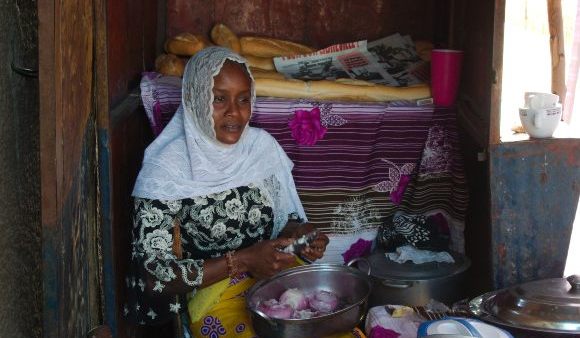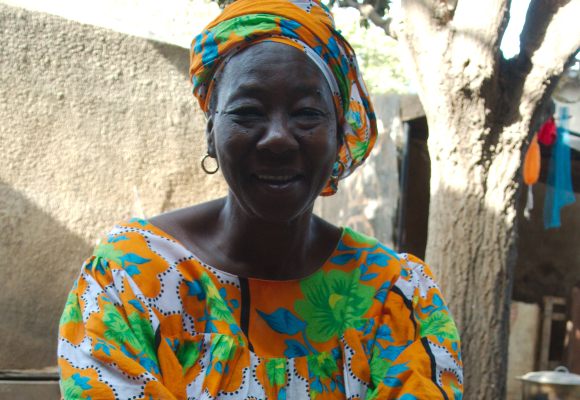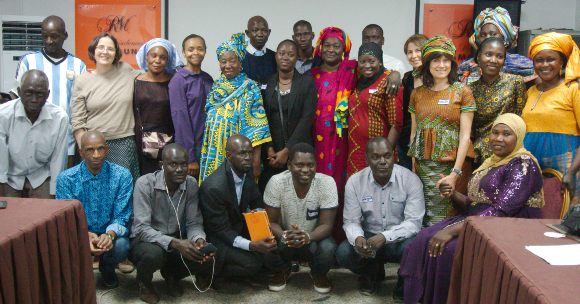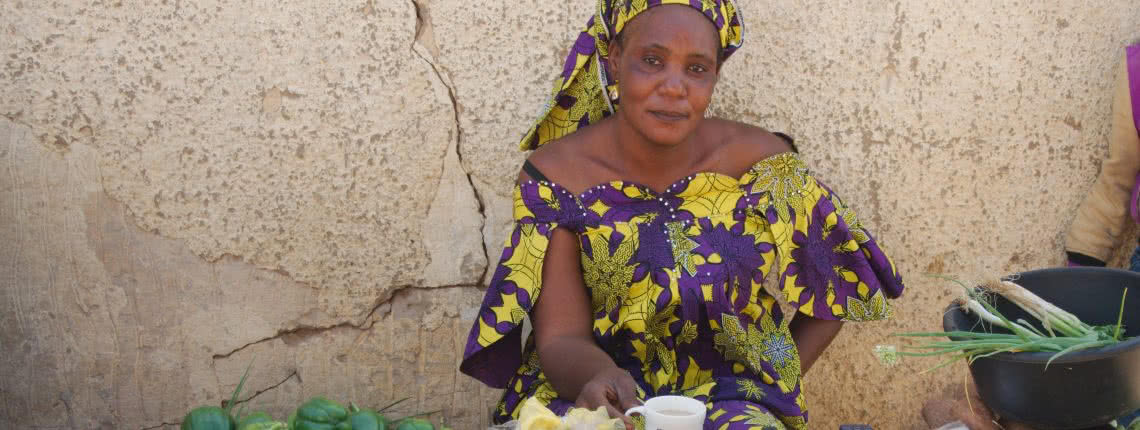Policymaking that impacts informal workers rarely comes with first-hand knowledge of their lives and needs. A new initiative in Dakar, Senegal, aims to change that. WIEGO’s Exposure Dialogue Programme gives lawyers and city officials two full days with workers — living and working alongside them — to experience their everyday realities and to use this experience to rethink legal and policy frameworks at a time when the city and the country are transforming rapidly.
In his inauguration speech in April 2019, Senegal’s new president, Macky Sall, set out his vision for an “Emerging Senegal” to transform the African country into a modernized nation. It’s a phenomenon that is playing out across developing countries, as politicians push shiny images of new downtowns that have little resonance with the ground reality or needs of the people.
For informal workers, these visions of a “modern” city often leave them out completely, despite being over 61 per cent of today’s workforce and upwards of 80-90 per cent in many developing countries. In Senegal, the informal sector makes up over 60 per cent of all non-agricultural employment. Many informal workers make their living as street vendors or market traders in public spaces — a key target for President Sall’s urban-transformation plans.
But through the EDP, participants came to see a new reality — that of hard-working, productive, resilient women and men who contribute to their communities and society.
Although informal workers, such as street vendors, are often blamed for increased congestion and uncontrolled use of public space, they are actually providing key services to cities. For instance, they ensure food security by making available affordable essential goods to underserved communities. Their economic activity accounted for a whopping 41.6 per cent of the total GDP in 2011.
Read more about the contributions, challenges and demands of informal workers in Dakar.
In an effort to raise their concerns and include informal workers’ organizations in defining the future of the city, WIEGO’s Law and Urban Policies-Focal Cities Programmes launched a new initiative to bring lawyers and urban officials into the lived realities of the city’s working poor.
The Exposure Dialogue Programme (EDP), held in April 2019, aimed to debunk commonly held myths about the informal economy by showing the significant economic and social contributions informal workers make in cities; creating alliances between informal workers’ organizations, legal practitioners and public officials; and preparing a fertile ground for the creation of an enabling legal environment for informal workers to be recognized and secure their livelihoods.
Read more about the Exposure Dialogue Programmes.

Dakar Lawyers Immerse Themselves into the Lives of Informal Workers
The Law EDP in Dakar hosted 11 participants — with nine lawyers (among them a trade unionist and one public official from the city) — who lived with and shadowed workers in public spaces and waste pickers for two full days. The EDP was based on a methodology developed by the Indian Self-Employed Women’s Association (SEWA), and combines real-life experience (exposure), reflection and dialogue.
In the Dakar EDP, participating workers were street, market, and food vendors, as well as waste pickers. They are members of the worker groups Synergie des marchands ambulants pour le développement (SYMAD), Bokk Diom, Association des marchandes du marché Mame Diarra, and Coopérative Artisanale des Femmes pour la Solidarité (CAFEM).
How can the law — so often seen as the enemy, a weapon used by the local authority to control and stifle workers’ activities — be turned into an enabling tool for growth and inclusive development?
On the first day of the programme, lawyers and practitioners discussed the existing legal framework and learned about how informal workers in other countries used the law to defend their rights. They then spent two days with their host families, joining in their work and living in their homes. On the last day, all EDP participants had the chance to reflect on the experience, share their reflections, and define next steps.
Read two key wins for street vendors: “India’s National Policy on Urban Street Vendors” and “A Durban Street Vendor Wins a Precedent-setting Victory in Court.”

Building Alliances
The exposure had a surprising impact on the participants. During the introductory session, participant lawyers argued that workers’ problems can be attributed to the failure to organize and lack of compliance with the law. Their comments echoed some of the typical myths around informal workers and tax evasion and the notion that informal workers earn more than formal workers.
But through the EDP, participants came to see a new reality — that of hard-working, productive, resilient women and men who contribute to their communities and society. And they confronted their hosts’ everyday problems together with them.
“I saw people with integrity, contrary to what others think. People that believe in themselves. I think they have a place in society.”
Those who stayed with workers in public spaces witnessed street and market vendors paying the municipal governments daily fees (referred to by the workers and officials as “taxes”) to sell their products on the streets. They learned that despite paying daily fees, these workers are subjected to periodic evictions.
The EDP participants felt the uncertainty and precariousness of living in the shadow of punitive laws, unrecognized rights and gray areas, leading to discretion and abuse by the authorities.
“[...] the law allows vendors with stalls to sell: we say ‘if you have a stall, you are allowed to vend.’ But what we saw at Grand-Yoff [Market] was that the municipality lets them sell, but evicts them every two months even though they pay taxes.”
Read about informal workers and the payment of taxes.
Those who stayed with waste pickers working in the Mbeubeuss dump found dignified persons making their livelihoods under very precarious working conditions, particularly women, and witnessed the lack of support from national or municipal governments.
“They told me repeatedly about their desire to unionize, because they need an organization that can make their voice be heard — for they have problems with the municipal authority [...]. They are people that need support to better organize.”
Learn about the work WIEGO is doing with waste pickers in Dakar.
Everywhere they went with workers, the participants saw the lack of public services, such as healthcare, infrastructure, childcare and transportation.
They also learned that, in the face of recurrent evictions, informal workers often prefer to operate in small, neighbourhood markets in order to avoid interfacing with authorities who abuse their power. Workers have little access to resources to defend themselves and find enforcing authorities and the judicial system either so negative or pointless to the extent that workers find spaces where they can avoid facing them.
But in the midst of all the challenges, lawyers, activists and officials talked about their hosts’ hopes for a future where they, too, are recognized as productive members of society and part of an inclusive city.

Steps to Legal Empowerment
What, then, can be done to support informal workers in Senegal? How can the law — so often seen as the enemy, a weapon used by the local authority to control and stifle workers’ activities — be turned into an enabling tool for growth and inclusive development?
Informed by their experience and shared reflections, EDP participants agreed on three key desired outcomes: the defense of rights, the elaboration of adequate legal frameworks reflecting Senegal’s economic reality, and leveraging the potential of the informal economy.
After the two days spent together, EDP participants (both lawyers and informal worker leaders) designed concrete, targeted interventions that would help informal workers organizations achieve their goals. Their call for action quickly materialized into a two-fold strategy to build the capacity of informal workers’ organizations to use the law as a tool to defend and advance informal workers’ rights, and to build partnerships with allies and spaces for dialogue with key stakeholders and decision-makers.
The roadmap designed by EDP participants prioritized the following:
- Providing legal education and rights-awareness trainings;
- Supporting the process of institutionalization (registration) of informal workers’ organizations;
- Documenting best practices;
- Providing support for informal workers’ organizations to have access to justice through pro-bono clinics and legal advice;
- Promoting collaboration with unions;
- Enhancing informal workers’ organizations advocacy capacities;
- Creating spaces for information exchanges and dialogue with local governments;
- Providing access to the Haut Conseil des Collectivités Territoriales (HCCT) (High Council for Local Governments) to create spaces to work with mayors; and
- Providing entry points to partner with local governments and other potential allies.
Having a roadmap and a Plan of Action with clearly identified steps is certainly a key for success. But perhaps the greatest achievement of this EDP was the transformation of a small group of legal professionals used to seeing the law as a rigid construct learned in books and used in the courtroom to committed allies, active partners, and champions of the cause of informal workers. They became convinced — and committed to convincing others — of the worth of these marginalized economic actors and of the need to include them in the definition of the future of their cities and their country. Immersed in the lives of informal workers, EDP participants came to see the real impact that rules and regulations have on their hosts.
An EDP host, a street vendor working on Dakar’s busy streets and struggling everyday with fees to pay and impending evictions, noted:
“They [the lawyers] lived like I lived. [...] They accepted me. We discussed [...] my job, my life, my perspective. If you want to help a human being, you must know who he is”.
Seizing new opportunities for dialogue and participation
Dakar’s informal workers face significant challenges arising from a punitive legal framework and an increasingly limiting policy environment. But the government's new emphasis on using the principles of rights and responsibilities as the axis to define government-civil society relations may open up spaces for informal workers to defend their rights, and, eventually, push for a more enabling legal framework that recognizes them.
To do so, the legal empowerment of strong informal worker organizations and the work in tandem with lawyers, allies in the labour movement, and municipal officers are a must.
The Law EDP in Dakar was a firm step in that direction. It gave participants access to a reality that is often overlooked and denied — a lens into how policies and regulations born of ideology and political convenience impact the life and work of people, especially the most voiceless and vulnerable. The EDP facilitated the creation of linkages between legal professionals and public officials, on the one hand, and between these figures and informal workers ́ organizations, on the other.
Going forward, solidarity between these actors can also contribute to strengthening the position of informal workers as they seek spaces for dialogue with authorities and try to participate in the definition of the future of the city — their city.
Read more about the Law Exposure Dialogue Programme and our Dakar Focal City initiative.
Feature photo: Olga Abizaid
Pour lire cet article en français, cliquez ici.
